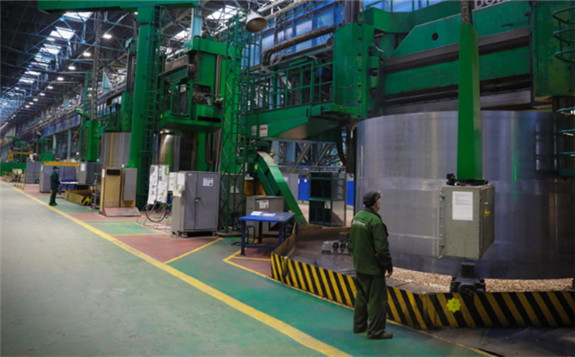Russia's Atommash has begun the manufacture of major components for the first of two VVER-1200 reactors to be constructed at the Xudabao site in China's Liaoning province. Construction of Xudabao units 3 and 4 is expected to begin this year and next, respectively.

The general contract for the construction of Xudabao 3 and 4 was signed in June 2019 by Russian state nuclear corporation Rosatom's engineering subsidiary ASE and China National Nuclear Corporation. Rosatom will supply the nuclear islands for the two units, with the turbine generators and balance of plant being Chinese. The contract followed the signing a year earlier of an agreement between China and Russia to build the units.
According to its contract, Atommash - part of the Volgodonsk branch of Russia's AEM Technology - will manufacture and deliver two VVER-1200 reactors, two sets of steam generators, the reactor cooling pumps, the main circulation piping and two pressurisers. The total weight of these components is about 6000 tonnes.
Atommash said the blanks of the steam generator and reactor vessel shells have passed the incoming inspection, and the production of those parts has now started. Machining of each 92-tonne shell of the nozzle area of the reactor vessel will be carried out over 15 days. At the same time, preparation for anti-corrosive overlaying of the shell of the reactor core will be performed. Machining of the steam generator shells, each weighing 37 tonnes, will take six days. Upon completion of the machining of 16 blanks, workers will start manufacturing the steam generator vessels.
AEM Technology Director General Igor Kotov noted the Xudabao plant is the second one for which the company has supplied major components, following the Tianwan plant in Jiangsu province.
"We already have an extensive experience of meaningful cooperation with Chinese colleagues, and our equipment has a good account at the Chinese market," he said. "I am confident that our activities on implementation of the new project will fully meet the expectations of our partners and will once again confirm the high competencies of the Russian nuclear power engineering industry."
The Xudabao project was originally expected to comprise six Chinese-designed CAP1000 reactors, with units 1 and 2 in the first phase. Site preparation began in November 2010. The National Development and Reform Commission gave its approval for the project in January 2011. China's National Nuclear Safety Administration announced its approval of the site selection for Xudabao units 1 and 2 in April 2014.
In September 2018, Rosatom said it expected to commission Xudabao 3 and 4 in 2027-2028.
TVEL, Rosatom's nuclear fuel manufacturing subsidiary, signed in November 2019 a contract for fuel supply to the two units.